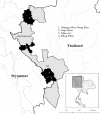Beliefs, taboos, usages, health perceptions, and practices toward wildlife among different ethnicities in Tak and Mae Hong Son Provinces, Thailand
- PMID: 39242509
- PMCID: PMC11380376
- DOI: 10.1186/s12889-024-19941-5
Beliefs, taboos, usages, health perceptions, and practices toward wildlife among different ethnicities in Tak and Mae Hong Son Provinces, Thailand
Abstract
This concurrent qualitative study was carried out with the main objective to determine wildlife beliefs, taboos, usages, health perceptions, and practices among ten ethnic groups in four communities in Tak and Mae Hong Son provinces of Thailand from November 2020 to January 2021. We also gathered comprehensive information on study respondents' knowledge related to potential risk behaviors that could lead to zoonotic disease transmission and infection. Furthermore, we intended to use the study's findings to develop communication strategies and health literacy improvement interventions for mitigating risky behaviors, with a focus on ethnic groups and particular individuals who live in close proximity to forests and wildlife, to prevent future pandemics. Sixty-five respondents were purposively selected based on their extensive knowledge, active participation in local cultural contexts, beliefs, and exposure to wildlife contact or consuming game animals. Twenty (30.8%) participated in in-depth interviews (IDIs), while 45 (69.2%) participated in eight focused group discussions (FGDs). The results revealed that the characteristics of wildlife contact are similar and distinct based on their beliefs and taboos among various ethnic groups and study locations, which are influenced by cultural backgrounds and traditions. Although some ethnic groups do not have explicit restrictions on the consumption of wildlife, others adhere to specific beliefs and taboos that forbid the consumption or killing of specific wild animals. These beliefs frequently correspond with conservation initiatives, thereby facilitating the preservation of threatened species. The study also revealed a lack of appropriate health knowledge, perceptions, and practices regarding wildlife contact and consumption. As a result, it is recommended that public health officials and local governments develop and execute communication and education initiatives. These campaigns should aim to increase health literacy and promote safe handling, preparation, and cooking practices to reduce the risk of zoonotic disease transmission and infection effectively. Moreover, it is necessary to design and implement wildlife conservation education and outreach activities. The programs should promote environmental stewardship while considering the cultural contexts, beliefs, and practices of various ethnic groups. The activities should involve diverse stakeholders, including local leaders, religious influencers, community members, schoolteachers, students, health professionals, village health volunteers, and civil society organizations.
Keywords: Belief; Culture; Ethnicity; Interface; Mae Hong Son; Perception; Taboo; Tak; Thailand; Wildlife.
© 2024. The Author(s).
Conflict of interest statement
The authors declare no competing interests.
References
-
- Buergin R. Shifting frames for local people and forests in a global heritage: the Thung Yai Naresuan Wildlife Sanctuary in the context of Thailand’s globalization and modernization. Geoforum. 2003;34(3):375–93. 10.1016/S0016-7185(02)00083-0 - DOI
-
- Puginier O. Planning, participation and policy: hilltribes overcoming the dichotomy between agriculture and forest preservation in Northern Thailand. Deutsche Gesellschaft für Technische Zusammenarbeit; 2002.
-
- Chunhabunyatip P, Sasaki N, Grünbühel C, Kuwornu JK, Tsusaka TW. Influence of indigenous spiritual beliefs on natural resource management and ecological conservation in Thailand. Sustainability. 2018;10(8):2842. 10.3390/su10082842 - DOI
-
- Lasimbang J, Luithui C. Natural resource management country studies: Thailand. Regional Indigenous Peoples’ Programme. Thailand, United Nations Development Programme Regional Centre in Bangkok &; 2005.
-
- Awaiwanont N, Pongsopawijit P, Paulsen P. In: Bauer A, Smulders FJM, editors. Bushmeat consumption and possible risks to consumers in Thailand Paulsen P. Wageningen Academic; 2014.
Publication types
MeSH terms
Grants and funding
LinkOut - more resources
Full Text Sources
Research Materials
Miscellaneous


